| Srl | Item |
| 1 |
ID:
183994
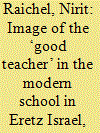

|
|
|
|
|
| Summary/Abstract |
This article discusses the image of the ‘good Hebrew teacher’ as perceived by the leading Hebrew teachers in Eretz Israel. The discourse, which began with the establishment of modern schools, developed in professional meetings of the leading Hebrew teachers and was reflected in teachers’ articles in the press and the professional journal Hahinuch, where they discussed the characteristics of the teacher’s personality and knowledge and of the teacher as a professional. Along with this profile, the article presents the educational work performed to realise it.
|
|
|
|
|
|
|
|
|
|
|
|
|
|
|
|
| 2 |
ID:
189421
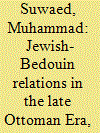

|
|
|
|
|
| Summary/Abstract |
The complex relationship between Bedouins and Zionist pioneers in the Land of Israel during the late 19th and early 20th centuries evolved along two parallel tracks: conflict and cooperation. The former was a corollary of the sociocultural gap between the pioneers and the Bedouins and revolved by and large around the diametrically opposed views regarding land ownership rights and their implications (e.g. access to water, grazing). The latter was a result of the growing Bedouin realisation that the Zionist project was there to stay: the more the Jewish pioneers proved their determination to cultivate their lands and defend themselves the more they won Bedouin respect, or at least grudging acquiescence, which in turn evolved to wider recognition of the vast socioeconomic benefits of peaceful coexistence.
|
|
|
|
|
|
|
|
|
|
|
|
|
|
|
|
| 3 |
ID:
138573
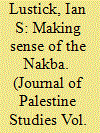

|
|
|
|
|
| Summary/Abstract |
Zionist claims to rightful rule of most or all of Palestine/the Land of Israel ultimately depend on naturalizing those claims into common sense, for Jews, of course, but also for the international community. Following the 1967 war, Israelis in favor of withdrawing from occupied territories have relied on distinguishing between the justice of the 1949 Armistice Lines, and the process that led to the State of Israel within those lines, versus the injustice of the occupation of territories conquered in 1967 and of their settlement and gradual absorption. But as the truth of the expulsions and forced dispossession of Palestinians in 1948 becomes accepted by wider swaths of both Israeli-Jewish and international public opinion, the traditional narrative distinguishing the justice of 1948 and the injustice of 1967 breaks down. Ari Shavit’s book, My Promised Land, can be understood as a response by Israeli two-staters to accusations of hypocrisy by the extreme right.
|
|
|
|
|
|
|
|
|
|
|
|
|
|
|
|
| 4 |
ID:
164324
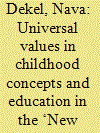

|
|
|
|
|
| Summary/Abstract |
The tension between universal and local values is reflected in educational discourse in every period and society. The education of children serves to strengthen national identity and local culture in the face of globalising trends. This article examines the position and influence of western childhood images and pedagogical concepts, developed mainly from the eighteenth century onward, on the concepts and attitudes of educators of the Jewish national revival in the Land of Israel at the beginning of the twentieth century. Its focus is on the period in which the Hebrew educational system was founded, and children were valued as the future generation that would materialise the adults’ national hopes.
|
|
|
|
|
|
|
|
|
|
|
|
|
|
|
|
| 5 |
ID:
171677
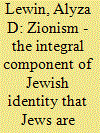

|
|
|
|
|
| Summary/Abstract |
The yearning and determination of Jews to re-establish their Jewish homeland in the Land of Israel is “Zionism” – an integral component of Jewish identity. It is more than the political movement launched in the 1800’s. The deep religious, ancestral, and ethnic connection of Jews to the Land of Israel is as old as Abraham and the Bible. Jewish messianic movements brought Jews to Israel between the 13th and 19th centuries, proving the Jews’ historic sense of peoplehood and their belief in the “ingathering of the exiles.” Only in the 18th century did Jews first shed this element of Jewish identity because European governments demanded this surrender in exchange for citizenship. Why are Jews demonised and marginalised today when they express support for Israel? It is a modern manifestation of the antisemitic pressure on Jews to shed the national and ethnic part of their Jewish identity. Discrimination against anyone who observes the Jewish Sabbath, wears a kippah, or maintains a kosher diet is universally recognised as antisemitism. It is equally antisemitic to marginalise or harass Jews for expressing the Zionist component of their Jewish identity. Isolating and dehumanising Zionists is akin to branding Jews with a virtual “yellow Star of David.” To ensure that history does not repeat itself, we must forcefully condemn this modern mode of antisemitism.
|
|
|
|
|
|
|
|
|
|
|
|
|
|
|
|